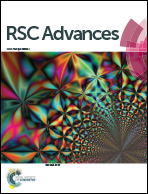Eco-friendly synthesis of ZnO nanopencils in aqueous medium: a study of photocatalytic degradation of methylene blue under direct sunlight†
Abstract
Synthesis of monodispersed nanostructures would be attractive if the synthesis is simple, one step and cost effective. In this work, an eco-friendly approach for the synthesis of ZnO nanostructures using the aqueous extract of pomegranate peel has been described. ZnO nanoflakes were formed initially upon 15 min sunlight irradiation of an aqueous solution of Zn acetate in the presence of pomegranate peel extract. We observed that the nanoflakes formed are converted to ZnO nanopencils upon mild heating. The nanopencils have been characterized by diffused reflectance spectroscopy, X-ray diffraction analysis, photoluminescence spectroscopy, FT-Raman spectroscopy, X-ray photoelectron spectroscopy, scanning electron microscopy, and transmission electron microscopy. Furthermore, we examined the photocatalytic activity of the ZnO nanopencils and compared the performance with commercial ZnO and TiO2 (P25) nanoparticles towards the photocatalytic degradation of methylene blue under direct sunlight irradiation. The total carbon removal efficiency of the ZnO nanopencils for methylene blue is 95% which was achieved by 4.5 h.


 Please wait while we load your content...
Please wait while we load your content...